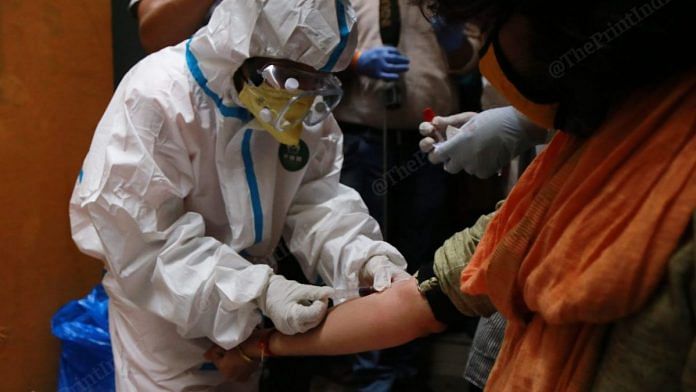New Delhi: India’s second sero survey, conducted in the same 700 villages across 70 districts where the last survey in April was done, has revealed an infection rate of 6.6 per cent in the population aged more than 10 years.
It also estimated that in August, the total number of infections in the country was anywhere between 9-11 crore. The prevalence rate in adults was 7.1 per cent. The last sero survey, which covered only adults, had shown a 0.73 per cent prevalence of infection coming to a total of 64 lakh infections in early May.
The survey, conducted by the Indian Council of Medical Research (ICMR), estimated that there were 26-32 undetected infections per reported case by August, which means that the actual number of infections in that month was between 9,59,70,316-11,81,17,312. The reported cases on 31 August was 36,91,166.
The survey also estimated that one in 15 individuals aged more than 10 years was estimated to have been infected in August.
“The fact that there were 26-32 undetected infections against 81-130 in May shows the success of our testing and contact tracing strategy. Lockdown/containment and behavior change at population level have effectively checked the potential spread of SARS-Cov-2. However, the data show that susceptibility of a considerable section of people, yet unexposed to SARS-Cov-2, exists,” said Dr Balram Bhargava, Director General, ICMR, while presenting the survey.
“The risk in urban slums is twice than that in non-slum areas and four times than the risk in rural settings,” he added.
The survey showed an incidence of 15.6 per cent in urban slums, 8.2 per cent in non-slum areas and 4.4 per cent in rural areas, reinforcing the fact that the SARS-CoV-2 virus loves crowded spaces.
The survey was conducted between 17 August-22 September. Blood samples were collected from 29,082 individuals.
Sero surveys in cities have, however, shown different figures. Delhi, for example, showed a 23.5 per cent and 29.1 per cent prevalence in the first two surveys. Mumbai showed a prevalence of 57.8 per cent in slums and 17.4 per cent in non-slums, Chennai showed 21.5 per cent, Ahmedabad 17.6 per cent, Puducherry 22.7 per cent and Indore 7.8 per cent.
Replying to a question from ThePrint about the changes being incorporated in the Covid strategy given that so many infections were missed, Dr V.K. Paul, member (health) NITI Ayog, said: “No country can identify every asymptomatic individual that is why sero survey is an additional tool.”
Dr Bhargava also shared data from other countries to show that India’s infection incidence is at par with countries such as the US (9.3 per cent), Brazil (2.8 per cent) and Spain (4.6 per cent).
Also read: 28.3% of Delhi’s population now exposed to Covid, shows second sero survey, up from 23.4%
‘Don’t agree with Rs 80,000 crore estimate’
Without naming Adar Poonawalla, CEO of the Serum Institute of India, health secretary Rajesh Bhushan said that the government does not agree with the Rs 80,000 crore estimate that he had drawn up for disbursement of vaccines.
Poonawala had last week tweeted: “Quick question; will the government of India have 80,000 crores available, over the next one year? Because that’s what @MoHFW_INDIA needs, to buy and distribute the vaccine to everyone in India. This is the next concerning challenge we need to tackle. @PMOIndia”.
Quick question; will the government of India have 80,000 crores available, over the next one year? Because that's what @MoHFW_INDIA needs, to buy and distribute the vaccine to everyone in India. This is the next concerning challenge we need to tackle. @PMOIndia
— Adar Poonawalla (@adarpoonawalla) September 26, 2020
Replying to a question, Bhushan said: “A tweet was brought to our notice. The person who posted it immediately afterwards also tweeted that he has confidence in the government of India. However, we do not agree with the estimates drawn up by this person. The vaccine strategy group headed by Dr V.K. Paul has drawn up estimates. But I just want to say that the government has enough resources.”
‘15 lakh testing capacity’
Addressing persistent concerns about India’s testing numbers varying widely, Bhushan said that the country has the capacity to test 15 lakh samples a day.
“But that does not mean we have to test that many samples every day. Testing depends on many factors. That is why daily variations in testing are not a matter of concern. We should track weekly tests done,” he said.
However, he reiterated the fact that the government of India is concerned about symptomatic people, who test negative in antigen tests, not being retested with RT-PCR and the matter has repeatedly been flagged, including in the meeting that the PM chaired with the seven high-burden states last week.
Even while Bhushan in his presentation showed that most high-burden states are showing a week-to-week reduction in numbers, Kerala remains an exception where numbers are going up. The state government has said that the rise happened after Onam.
“India has managed the pandemic to a very very very large extent. It is in control. We are lucky and give credit to our leadership and people of India,” Dr Paul said, while reiterating his appeal for universal use of masks.
Also read: ICMR denies sero survey hushed up data showing up to 48% Covid reach in hotspots in May



